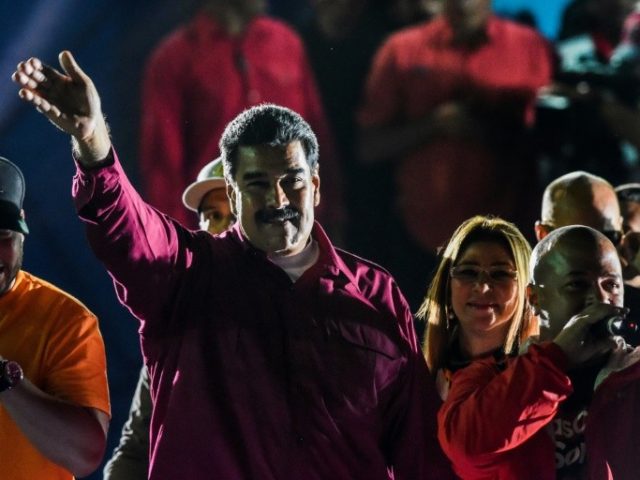Venezuela’s dictator Nicolás Maduro declared himself the winner late Sunday of a presidential election widely dismissed as fraudulent, and marred by record low turnout, against a fellow socialist and a televangelist whose campaign signature was handing out free soup.
The election “victory” ensures Maduro will remain at the helm of the nation until 2025, barring regime change.
Venezuela’s National Electoral Commission (CNE), which Maduro controls, announced Sunday that Maduro had won the presidency with nearly 6 million votes. Henri Falcón, a socialist who turned against Maduro after dictator Hugo Chávez’s death and received near-universal condemnation from the Venezuelan opposition, reportedly received 1.8 million votes. Javier Bertucci, a popular televangelist, received 925,000 votes, and Reinaldo Quijada, a chavista who ran to the left of Maduro, received little more than 34,000 votes. According to the CNE, 8.6 million Venezuelans voted in the election.
Both Falcón and Bertucci have claimed that the government engaged in rampant election fraud. Bertucci’s campaign, according to the Venezuelan newspaper El Nacional, revealed Monday that it had documented with eyewitnesses and photographs at least 380 instances of election fraud at the ballot, most cases of Maduro supporters violating election law by campaigning and pressuring passersby to vote next to designated voting stations.
Bertucci, who regularly handed out free food at campaign stops to attract voters in the emaciated country, accused Maduro’s regime of “playing with the hunger of the people, using food and money to buy votes.”
Henri Falcón has refused to accept the results of the election and alleged the same election violation that Bertucci did: the posting of socialist campaigners for Maduro at election posts to pressure voters into supporting Maduro. Falcón claims he documented 142,589 instances of election irregularities and has 91,700 witnesses to back him up. Among the violations are the use of socialist mobs to pressure people into the polls, Maduro representatives walking into voting booths with voters to ensure they chose Maduro, and handing out free food to the nation’s poorest to secure votes for Maduro.
Falcón has also called for another election, eliciting outraged mockery from the anti-socialist Venezuelan opposition.
The opposition, along with outside observers, agree with the candidates that the election was widely fraudulent and not representative of the will of the Venezuelan people. Several election observers have accused the CNE of fabricating the number of voters.
Even accepting the CNE’s numbers as legitimate, electoral affairs journalist Eugenio Martínez reported on Friday that they would represent “the greatest abstention [from an election] in our democratic history,” beginning with the fall of the dictatorship in 1958. While Maduro officially received a majority of the votes counted, Martínez notes that the raw numbers suggest that 71 percent of eligible voters did not come out for Maduro.
The Democratic Unity Roundtable (MUD), a coalition of opposition parties that includes socialists, issued a statement claiming that their independent count found that turnout was under 30 percent. Official CNE estimates claimed 46 percent of voters participated.
The Lima Group, a coalition of free countries in the Americas that oppose the Maduro regime, announced that their observers found that 82.96 percent of eligible voters did not participate in the election.
Antonio Ledezma, the exiled mayor of Caracas, said in a Twitter post that, according to estimates he received, “Sunday marked the largest civic strike Venezuela has ever known, over 80 percent of the population rejected the electoral fraud.”
In addition to the large abstention rate, reports began circulating on social media Sunday night of protests in response to the CNE’s results announcement. Individuals in numerous Venezuelan cities began posting videos from their windows of the loud banging of pots and pans from homes below, a common form of expressing political displeasure in Latin America. Some eyewitness reports also indicated that police began using tear gas to repress protesters taking the streets against Maduro.
Maduro announced he would schedule a presidential election in December for April, but eventually pushed the date back to May 20, Cuban Independence Day (the Cuban government, through nearly one hundred thousand proxies, controls Maduro’s regime). In December, he also announced that he would ban the MUD from the election. The MUD responded by urging supporters not to participate in the election at all.
In January, Maduro debuted an election logo and campaign song that violated electoral laws, but the CNE never ordered him to change them.
Sunday’s election is the fifth such fraudulent election in Venezuela in six years.

COMMENTS
Please let us know if you're having issues with commenting.